Keto protein powder is a great way to help you meet your protein needs while keeping your carb intake low, but you may find yourself a bit overwhelmed by all of the choices.
You also need to pick one with the right macros to keep you in ketosis and the right micronutrients to ensure your body has all of the essential building blocks it needs for health and performance.
Here are our top-rated keto-friendly protein powders available on the market right now.
Research
Rankings
Last updated: July 28, 2022
Keto protein powders considered: 22
Hours of research: 48
Experts reviewed: 4
1. Ladder Whey Protein Powder
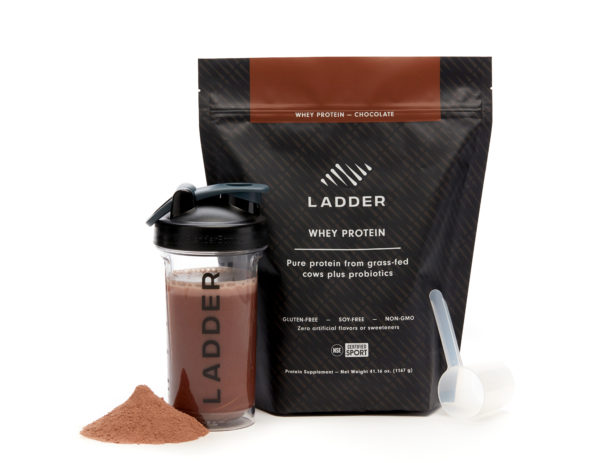
Ladder’s whey protein powder is great for people following a keto lifestyle, as it almost complete devoid of any insulin spiking carbohydrates. It includes a complete essential amino acid profile along side probiotics to help boost your metabolism, muscle building and weight loss results.
On top of these great ingredients, it’s also packed with vitamins and trace minerals that are essential for building muscle, recovering from workouts, and repairing the damage incurred by intense training sessions.
Every batch is tested for purity and the entire line is NSF-certified, ensuring it is safe for those competing. BodyNutrition’s top choice for keto protein powder.
2. Garden of Life Sport Certified Grass Fed Whey
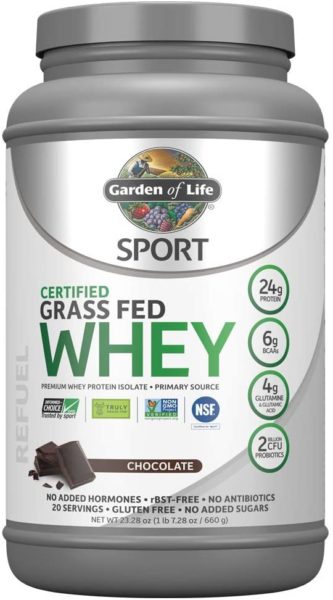
This whey protein powder by Garden of Life tops our list because it is the only one advertising that it’s been certified by NSF International — a third-party testing organization — for sport.
It’s made with organic, high-quality ingredients. In addition, it provides 24 grams of protein per scoop, with only 4 grams of net carbs.
3. Optimum Nutrition Gold Standard 100% Whey Protein Powder
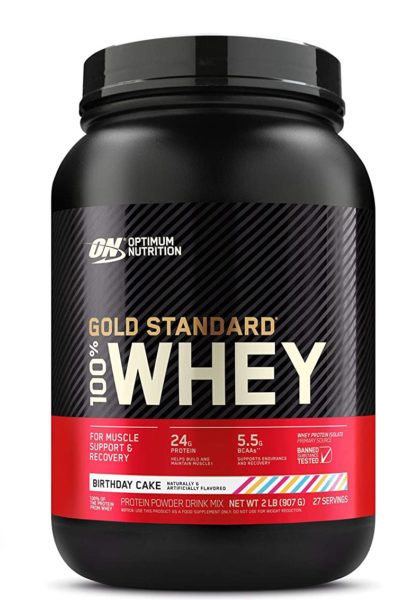
Gold Standard whey protein powder by Optimum Nutrition is certified by Informed-Choice.org, a third-party testing organization. This ensures its quality and the accuracy of the label.
Additionally, it’s full of protein and available in unique, dessert-like flavors such as birthday cake, salted caramel, and cake donut.
4. Dymatize ISO100 Hydrolyzed Protein Powder
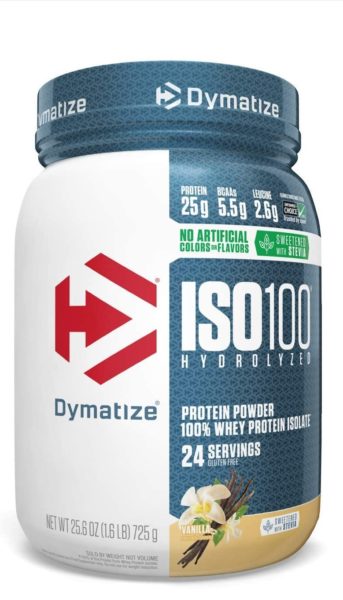
This whey protein isolate from Dymatize is also certified by Informed-Choice.org, making it a top contender. While each scoop contains 25 grams of protein, it only contains 1 gram of carbs — making it ideal for keto diets.
It also contains BCAAs and glutamine, which can help boost your workouts.
5. Isopure Zero Carb Whey Protein Isolate
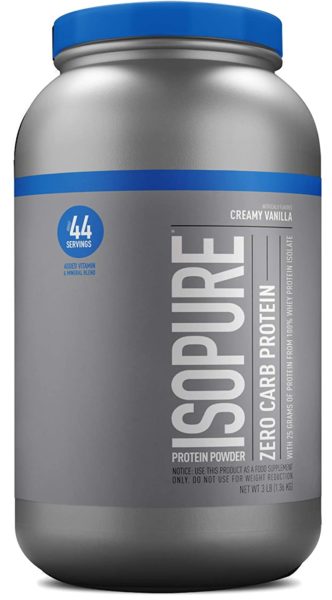
This whey protein isolate by Isopure is ideal for super-strict keto dieters because it contains zero grams of carbs per serving. It also provides 25 grams of protein per scoop, along with muscle-building branched-chain amino acids (BCAAs).
Additionally, it contains several vitamins and minerals to help you meet your nutrient needs.
6. Perfect Keto Whey
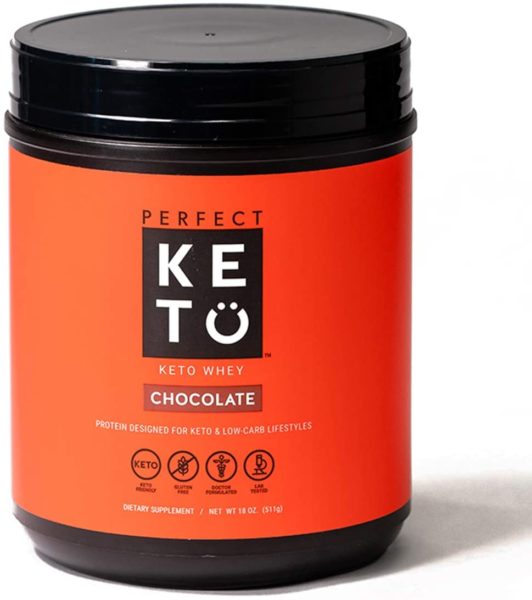
Perfect Keto is a trusted brand in the keto space, offering a variety of supplements and foods specifically-formulated for keto dieters. Their whey protein is made with clean, high-quality ingredients.
It even contains added medium chain triglycerides (MCTs), which are fats that may help boost your weight loss.
7. Ancient Nutrition Bone Broth Protein
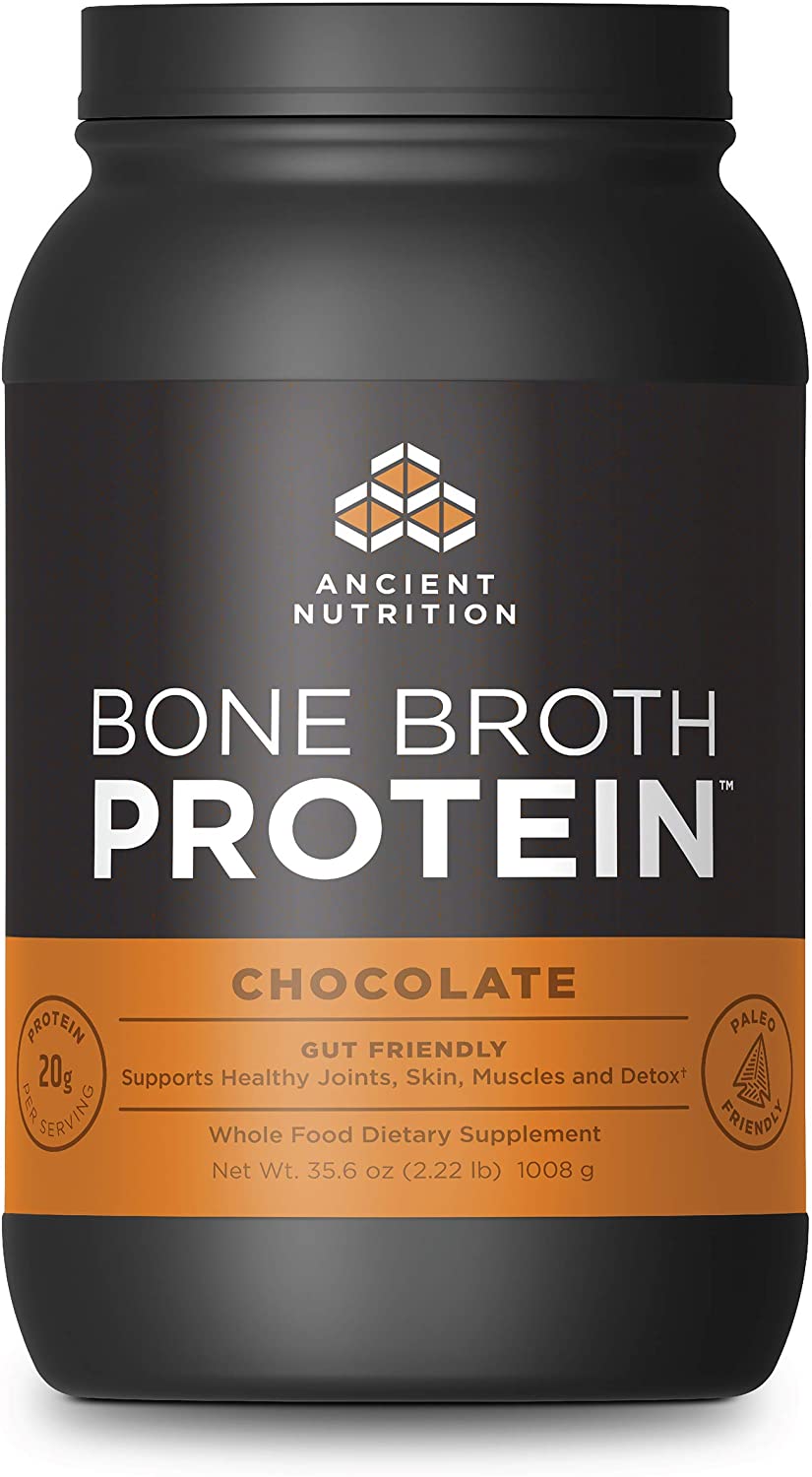
Ancient Nutrition is another trusted keto brand that reliably delivers great products. This keto-friendly protein powder is made with bone broth protein sourced from chicken bones, which keeps the carb content super low.
8. Quest Nutrition Protein Powder
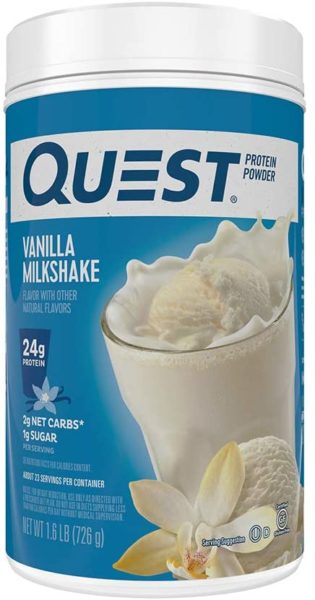
Quest Nutrition is known for their keto-friendly, high-protein bars, cookies, and chips, but they make a keto-friendly protein powder as well. Their powders come in several fun flavors like cinnamon crunch, cookies and cream, and cold brew.
Best of all, one scoop provides 24 grams of protein but contains only two grams of carbs.
9. Premier Protein Whey Protein Powder
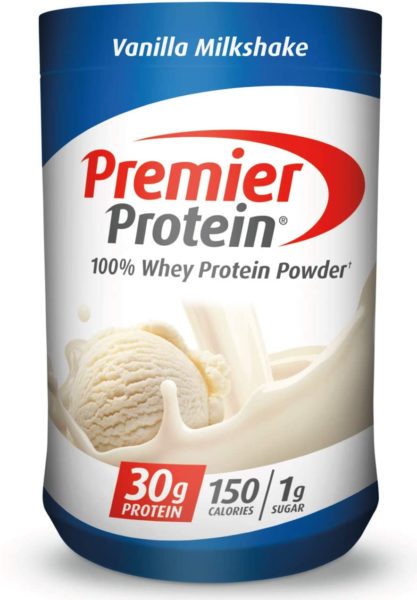
This whey protein powder by Premier Protein is a great option, providing 30 grams of protein and only two grams of carbs per serving. According to the manufacturer, this protein powder is great not only for making shakes, but also for baking with.
10. Orgain Keto Plant-Based Protein Powder
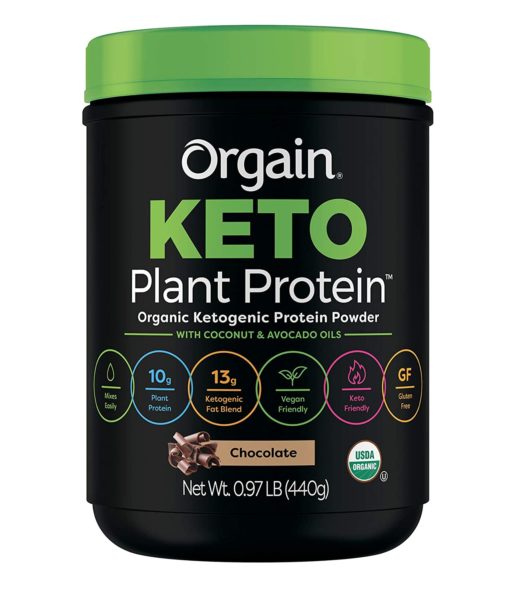
Rounding out our list of recommendations is Orgain’s protein powder. Made with pea protein, it’s both vegan and keto-friendly.
Although it contains 16 grams of total carbs, most of those are from fiber and sugar alcohols — so it only contains 1 gram of net carbs per serving.
Category winners
Best keto protein powder overall: Ladder Whey Protein Powder
Ladder takes our top overall spot thanks to its clean formulation, innovative combination of rapid and slow-absorbing protein, and its broad range of trace minerals, vitamins, and probiotics. It’s a fantastic all-around keto protein powder, and its taste is unparalleled too.
Best keto protein powder for weight loss: Isopure Zero Carb Protein Powder
If you’re looking to drop excess body fat, Isopure Zero Carb Protein Powder is an excellent pick thanks to its rock-bottom carb content and inclusion of important vitamins and trace minerals like vitamin K, biotin, zinc, and copper.
Best keto protein powder for adding muscle mass: Optimum Nutrition Gold Standard
For adding muscle and gaining strength, it’s hard to top Optimum Nutrition’s whey protein, which uses a blend of whey protein, isolate, and peptides to provide your muscles with all the building blocks they need for increased muscle mass.
Best keto protein powder for athletes: Ladder Whey Protein Powder
Ladder specifically caters to athletes by having their protein powder tested for purity by NSF for Sport, meaning you can be sure there are no prohibited contaminants in your product. Add to that trace minerals and probiotics that are especially useful for serious athletes and you’ve got a winning formulation.
Best keto protein powder for women: Ladder Whey Protein Powder
Ladder’s well-rounded formulation, which provides vitamins, essential minerals, and probiotics alongside grass-fed protein, is a great choice for women who want the highest quality ingredients in their keto protein powder. On top of that, it’s ultra-low in carbs, making it easily keto-compatible.
Best keto protein powder for meal replacement shakes: Isopure Zero Carb Protein Powder
Isopure is perfect for meal replacement shakes thanks to its inclusion of many of the micronutrients you’d be missing out on by skipping a meal. It also blends up well with other ingredients, making it great for keto shakes and other on-the-go meal replacement for keto dieters.
Who should buy keto protein powder?
Keto dieters often turn to keto bars, keto shakes, or keto protein powder when they’re travelling or on the go. That’s because most snack foods and restaurant meals aren’t made with the keto diet in mind. In fact, they tend to be packed with exactly the kinds of things you’re trying to avoid when on a keto diet—namely, sugar and refined carbohydrates.
Keto protein powder goes out of its way to keep the carb content low (often, at exactly zero) by avoiding using sugar for flavoring, like some traditional protein powders. You should think about getting keto protein powder if you are interested in a low-carb post-workout recovery shake, a high-protein, low-carb meal replacement shake, or just want a backup resource for when you don’t have the time or energy to make yourself a high-quality, keto-compliant snack or meal.
Keto protein powder can be a great buy even if you’re not on the keto diet—its low-carb design makes it great for more general low carbohydrate or low-sugar diets, and many keto-friendly protein powders are popular among bodybuilders for similar reasons. Keto protein powders tend to do a better job sourcing quality ingredients (for example, protein from grass-fed cows), and often have added perks like essential vitamins and minerals, or probiotics, that you won’t always find in a typical protein powder.
How we ranked
We ranked these keto protein powders based on our strict standards.
First, we assembled a list of several protein powders that could be used by people on the keto diet. These protein powders needed to be low in total or net carbs.
From this list, we prioritized the products that had pursued third-party testing from companies like NSF International and Informed-Choice.org. These organizations help ensure that supplements are high-quality and that they contain what their labels claim they contain.
Unfortunately, supplements — including protein powders — are not regulated by any governmental organizations. This means there’s little-to-no oversight. Some supplement manufacturers may take advantage of this by using false label claims, taking shortcuts on quality, or even completely lying about what the supplement contains.
However, third-party testing can help you have some assurance that the product you’re purchasing is honestly represented by what’s on its label.
Our top 3 recommendations — from Garden of Life, Optimum Nutrition, and Dymatize — had all pursued third-party testing from one of these organizations.
Next, we chose keto protein powders that contained additional beneficial ingredients, like BCAAs or MCT. BCAAs are a unique type of amino acid, or building block of protein. They can help boost your workouts and promote muscle growth, while MCT can help your body produce more ketones – potentially giving you an energy boost.
Finally, we ranked based on total carb content, as some keto dieters prefer to count total carbs over net carbs.
Net carbs are total carbs with fiber and sugar alcohols subtracted, as these compounds aren’t absorbed and don’t provide calories. They also have no effect, or just a minimal effect, on your blood sugar levels.
The final two protein powders on our list—from Atkins and Orgain—contain the highest total carb counts, but they are still solid choices.
Benefits
Keto protein powder can help you meet your protein needs. Protein is a key macronutrient, alongside fat and carbohydrates. It is made of amino acids, which the body needs to synthesize new tissues and proteins, and to build muscle. There are nine essential amino acids that we must obtain through the foods that we eat.
Sometimes it can be a struggle to meet your protein needs, especially if you are busy. Most people on keto need to get 20-25% of their calories from protein. Depending on your calorie intake, this could be anywhere from 65 grams of protein up to 150 grams or more per day.
Because most protein powders provide anywhere from 15-30 grams of protein per serving, they can make it easier to meet your protein needs.
Keto protein powder can help you build muscle. Getting enough protein can help you build muscle. Your body needs plenty of protein to help it synthesize new muscle, and protein powder can help you accomplish that.
One high-quality randomized controlled trial found that supplementation with whey protein — when paired with resistance training — significantly increased both strength and muscle growth in older women when compared to a control group that was also doing resistance training (1).
A similar randomized controlled trial found that wheat protein and whey protein could increase muscle synthesis in older men (2).
Overall, the evidence suggests that getting adequate protein — especially in combination with resistance training — can help you build muscle.
Additionally, many of the keto protein powders we recommend contain BCAAs — which are the amino acids leucine, isoleucine, and valine. These essential amino acids are uniquely beneficial for muscle growth, as research indicates they help reduce the damage done to your muscles as a result of exercise and help you recover more quickly by synthesizing new muscle tissues. This makes the inclusion of these amino acids a highly desirable addition to keto protein powders (3).
One study in younger men — in their early twenties — found that supplementing with BCAAs before exercise had less muscle soreness and damage after exercise compared to other groups (4). BCAAs are an excellent part of your routine, especially if you workout regularly.
Keto protein powder may help you have more energy. Many of our recommendations included MCT oil as an ingredient. MCT oil is a unique fat that is very easily converted to ketones, or the fuel that you burn for energy while you’re in ketosis instead of glucose.
Theoretically, including MCT oil in your diet can help you have more energy because it can help you produce more ketones.
In two different studies, people consuming MCT oil had more weight loss and fat loss than people consuming an equal amount of olive oil, suggesting that the MCT oil may have increased their energy expenditure (4, 5).
Another study found that having MCT oil with a meal instead of vegetable oil increased calorie burn while at rest over 4 hours by about 30 calories on average. Although this doesn’t seem like much, over time it could add up to a significant increase in calories burned (6).
Including MCT oil in your keto diet may help you to burn more energy, which can boost your weight loss.
Keto protein powder can help you get enough nutrients. Several of the keto protein powders we recommend also included additional nutrients. In this way, they could help you meet your nutrient needs. If you’re replacing meals with protein shakes, it’s a good idea to use a protein powder that contains added nutrients to make sure that all of your bases are covered.
In addition, it can be more difficult to attain some of the B-vitamins on the keto diet, because most people get their B-vitamins through fortified grains and cereals — which are off-limits on keto. By taking a protein powder that contains these nutrients, you can make sure you’re giving your body the nutrients it needs to keep functioning optimally.
Keto protein powder can help you lose weight. Finally, keto protein powder may help you lose weight. Getting adequate protein can help keep you full, making it easier to say no to extra snacks and calories you don’t need. Additionally, protein powders that contain added MCT oil may help you to increase your energy burn and set you up for weight loss success.
Side effects
Protein powder may have some unpleasant side effects, especially if you’re not used to using it regularly.
Keto protein powders may cause some digestive issues. Some protein powders may be bloating or cause gas. Make sure you drink plenty of fluids to help remedy this.
Additionally, some of the added ingredients in certain protein powders — like MCT oil — can have some unwanted side effects. Using MCT oil can cause diarrhea or other digestive issues when you first start, so it’s best to begin with a small dose and work your way up slowly to prevent these unwanted side effects.
Keto protein powders can lead to excessive protein intake. While protein is an important macronutrient for health and muscle building, it’s important that you don’t consume more than you need. Although many people regard keto as a high-protein diet, it’s actually a high-fat, moderate protein, low-carb diet. Eating excessive protein while on keto can kick you out of ketosis as some of that extra protein may be converted to glucose — or sugar — by the body.
Additionally, excess protein can be harmful if you have kidney disease or other kidney problems.
Some people may be allergic to ingredients in keto protein powders. Be sure to carefully check the ingredient label before you purchase to make sure that you’re not allergic to any of the ingredients that a protein powder is made with. Some protein powders contain common allergens like soy and milk.
Using too much keto protein powder may lead to weight gain. Protein powder can be used in a healthy way, but using excessive amounts of protein powder or drinking more than one or two protein shakes per day can lead to weight gain due to excessive calorie intake. Most protein powders contain around 100-200 calories per serving, so if you’re drinking multiple shakes per day — especially if they contain other high-calorie additions like milk, peanut butter, or chocolate — you may be consuming a lot of extra calories.
Keto protein powders may increase your risk of dehydration. High protein diets have been linked to a increased risk of dehydration, so using a large amount of protein powder may lead to dehydration as well. Be sure to drink plenty of fluids when you’re using protein powder.
Keto protein powders may interact with certain medications. Certain protein powders made from whey protein can interact with several medications. These include levodopa, a drug for Parkinson’s, as well as drugs used to treat osteoporosis along with several antibiotics. Talk to a healthcare provider before adding protein powder to your diet if you’re taking any of these medications.
Recommended usage
Protein powder is very easy to use. Generally, one serving of protein powder is 1-2 scoops. Most people consume their protein powder in the form of a shake. To make your shake, you can use water, milk, or plant-based milk.
Also protein shakes can be used as a meal replacement, you should also prioritize the inclusion of real, whole foods in your diet.
Protein shakes make a very convenient breakfast option that can sustain you until lunch.
If your goal is muscle growth, you should consume your protein shake prior to working out. If it contains BCAAs, this timing will help the BCAAs be the most beneficial in preventing muscle damage and soreness.
Also, you don’t have to use your protein powder just to make shakes. You can find several different uses for protein powder online, including a variety of dessert recipes. It can be stirred into yogurt or added to a keto “noatmeal” recipe. Many keto recipes also call for unflavored whey protein, as it can help add structure to baked goods like keto breads. It can also be used as an ingredient in the breading for battered and fried keto foods.
However, you shouldn’t go overboard with protein powder intake. The only people on keto who will have exceptionally high protein needs are those who are doing a lot of resistance training or weight-lifting. Most people only need 20-25% of their calories to come from protein, as the keto diet is a moderate protein eating plan. As a general rule, it’s best to limit yourself to one serving of protein powder per day, and aim to get the rest of your protein from high-quality, whole food protein sources like beef, pork, chicken, fish, eggs, shellfish, nuts, or seeds.
FAQ
Q: Do I need to use keto protein powder to lose weight successfully?
A: No, it’s not necessary to use keto protein powder for you to lose weight on keto. The most important factor for weight loss on the keto diet is restricting your carb intake to levels that are low enough to induce ketosis, where your body is burning fat for fuel instead of sugar. For most people, this is anywhere from 25-50 grams of total carbs per day, or less. In ketosis, you are less hungry — typically resulting in a naturally reduced calorie intake. Additionally, your body can easily and efficiently access its stored body fat to burn as energy because your insulin levels are lower.
Insulin is a hormone that helps manage your blood sugar levels. Some people who are overweight may be insulin resistant, meaning their body has to secrete more insulin than normal to manage their blood sugars. However, insulin signals your body to store excess sugar in the blood as fat — which can lead to weight gain and make it very difficult to lose weight. The keto diet helps your body to reduce its insulin secretions so that it’s easier for you to burn fat and lose weight.
So, you can see that protein powder is not a necessity in this process. However, protein shakes make an easy and quick meal that can help you stick to your diet instead of going out for fast food. They may also include some other additions that can boost your weight loss, like MCT oil.
Q: Do I need keto protein powder to build muscle or gain strength?
A: No, you don’t need a protein powder to build muscle or to gain strength. Resistance training alone can help you build muscle and get stronger.
However, there is some evidence that taking protein supplements can help you build muscle more quickly than working out alone. In addition, taking a protein powder that contains BCAAs can help mitigate the damage to your muscles during a workout and help you recover more quickly — which can potentially promote quicker muscle growth.
Q: Is collagen a good keto protein powder?
A: Collagen is a type of protein that is often supplemented on the keto diet. Although it’s got several benefits, it’s not ideal to use as a protein source.
Collagen is an incomplete protein, meaning it doesn’t contain all nine of the essential amino acids in the correct ratios like other animal products do.
The protein from meat, milk, and eggs — along with the protein in most protein powders — is made from complete proteins. However, collagen is one exception.
There are many other benefits to supplementing with collagen, though. It can provide moisture and elasticity to your skin, reducing the appearance of wrinkles and scars and helping you maintain a youthful appearance. It can also help strengthen your bones and joints, and collagen is a key component in your joints.
Collagen may also help strengthen your blood vessels, improving your vascular and heart health.
Collagen is a great supplement, but it should be used in addition to a protein powder — not as a replacement for protein powder or whole food protein sources like meat, fish, or eggs.
Q: How should I prepare protein shakes using keto protein powder?
A: Be sure to follow the manufacturer’s instructions. However, most protein powders can be used by simply mixing them with a liquid of your choice like water, cow’s milk, or plant-based milk. You can use a blender bottle or a blender. To get the protein powder to mix well, it’s best to add it to your cup after the liquid is added.
You can also add other additions to your protein shake to add some extra nutrition, like MCT oil (if it’s not already included), nut butters, greens, or adaptogen powders.
Q: Can I use keto protein powder for cooking or baking?
A: Yes, you can use keto protein powders in cooking and baking, although some may have a slight bitter taste after being cooked. Some of our recommendations, like the Premier Protein powder, advertise on the label that they are good for cooking and baking. There are hundreds of recipes online using protein powders to make desserts, baked goods, and even some entree dishes.
Additionally, you can think beyond the protein shake too. Protein powder makes a great addition to yogurt, mousse, or low-carb “noatmeal.” You can use it to make a high-protein dip for keto-friendly fruits like raspberries and strawberries. Unflavored protein powder can also be used as breading to make healthier, keto-friendly versions of your favorite fried foods.
Q: What is the best type of keto protein powder?
A: There are several types of protein powder, and each of them have their own benefits and downsides.
Whey protein is made from cow’s milk and it is the least expensive protein powder. It’s also a solid choice for muscle building, as several studies have shown promising in using whey protein along with resistance training to help people build muscle more quickly. Whey is also the easiest protein powder to find.
Casein is another type of protein powder that’s made from cow’s milk. Casein is more expensive and harder to find than whey protein, but it actually may slow down digestion and help you stay fuller for longer – which can be a benefit if you’re trying to lose weight.
Other common animal-based protein powders include egg white protein, which is made from egg whites. It is more expensive than whey protein, but a good option for people with milk allergies or intolerance.
Some collagen supplements are marketed as protein powders, but you should be mindful of the fact that collagen is not a complete protein. Unless a collagen supplement also contains another form of protein to make it complete, it may not be the best choice to use to help meet your protein needs.
Common vegetarian protein powders include hemp, pea, soy, and brown rice protein. All of these protein powders are formulated to be complete proteins, meaning they provide all nine of the essential amino acids. However, some of them don’t provide all nine of them in the correct ratios, so it’s important to eat a varied diet with plenty of nuts, seeds, and vegetables if you’re following a vegetarian or vegan keto diet.
Related articles
Recap
Using a keto protein powder can be an easy and convenient way to help you meet your protein needs on the keto diet. Getting enough protein can help you build muscle and help keep you full, promoting weight loss.
Additionally, many of these keto protein powders contain other compounds that may boost your workouts or help you lose weight, like BCAAs and MCT oil.
For BodyNutrition’s #1 recommended keto protein powder, click here.